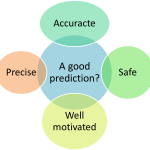 What does it mean to make predictions?
What does it mean to make predictions?
Why is it advantageous, if not mandatory, to make predictions in terms of probability distributions?
Is a prediction with a wide distribution automatically a worse prediction, compared to one with a narrow distribution?
Is it possible to evalaute the accuracy of the prediction of an individual (and perhaps unique) event?
Do we as scientists need to bother about the accuracy in predictions made by the theories we study and use as bases for predictions?
My answer to the last question is “Yes, when the predictions are to infom important decisions”.
It is good “to practice” on less important decisions. In an attempt to exaplain what it means to make predictions to my collegues I invited them to a predictive challenge. Persons participating in the running race through the medievial town of Lund were asked to state with uncertainty how fast they would run. Then I validated their predictions after the race was done. Several rewards were handed out.
Are you curious to know how this was done and what the rewards were? The results can be found at Lundaloppet Predictive Challenge
~Ullrika

